When you're a small support team that's primarily (or only) delivering support via email, Freshdesk is very affordable. But as your team grows and you start adding in channels, its cost can increase exponentially. Want to add live chat? You'll need to purchase Freshchat. Want to add phone support? You'll need to purchase Freshcaller.
If your team is starting to scale, it might be time to look for a customer support platform with more predictable pricing. Below, you'll find the nine best Freshdesk alternatives. We did a deep dive into each platform to understand what makes it unique, what types of companies it's best for, and how it compares on pricing.
1. Help Scout – Best Freshdesk alternative for growing businesses
Help Scout is a user-friendly and affordable customer service platform for growing SaaS and ecommerce businesses. It lets you deliver support via email, chat, self-service, and social on every plan, and it comes with all of the features you need to collaborate as a team, keep your requests organized, delight your customers, and scale your business.
Inbox
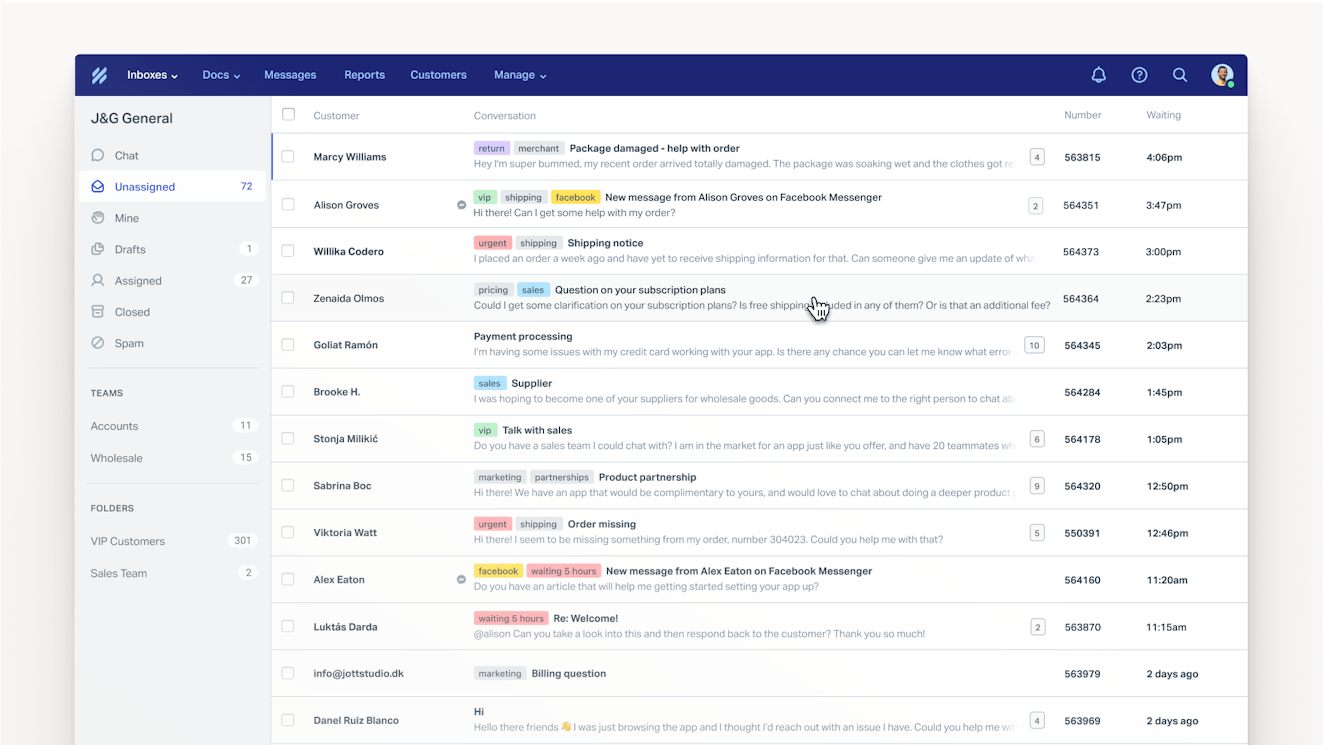
The heart of the Help Scout platform is Inbox, a shared mailbox that enables your team to work collaboratively to respond to customer conversations across all of the channels you support.
Inbox has all of the features needed to stay on top of the queue: conversation assignments, internal notes, collision detection, customer profiles, customer satisfaction surveys, and more.
In addition, it has features that can help with productivity and organization like tags, custom fields, saved replies, and workflows. Workflows help automate routine tasks like conversation assignments and tagging so your team doesn’t get bogged down by busywork.
Live chat and self-service
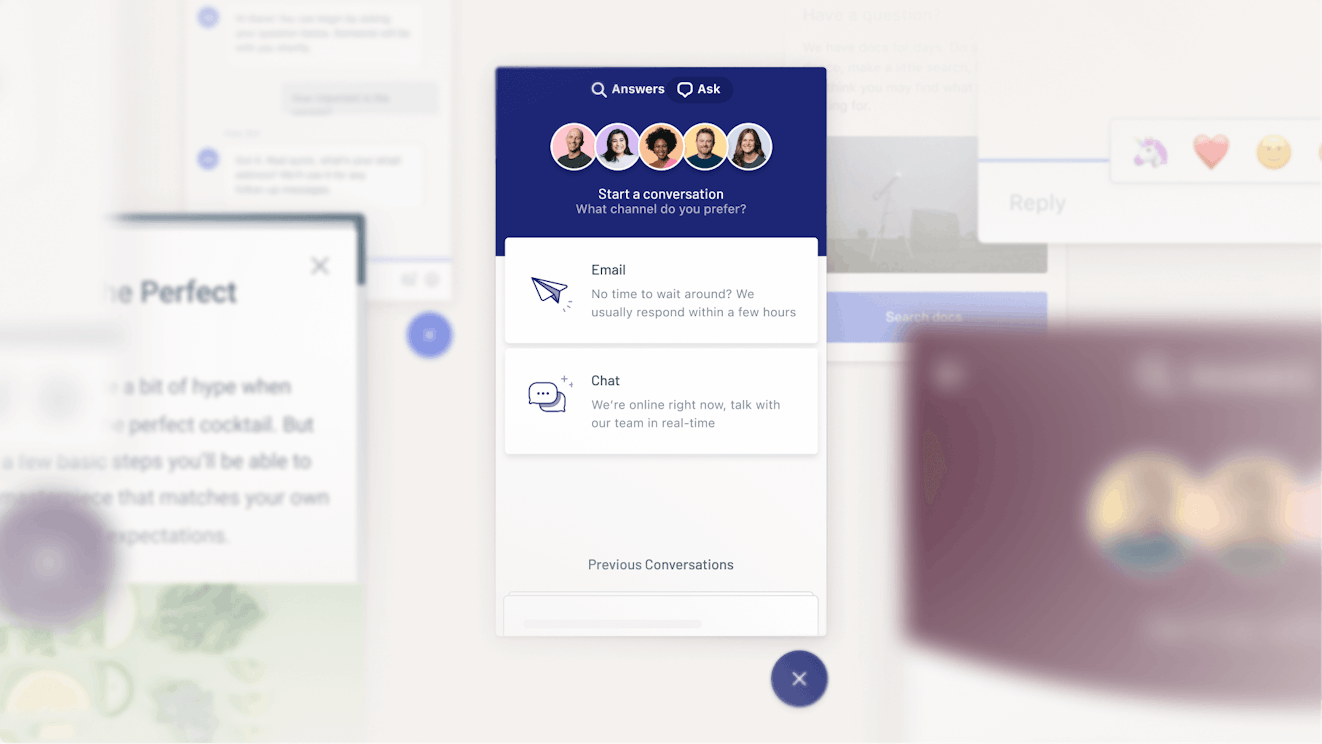
Help Scout is also great for customer engagement. Its web widget, Beacon, can help keep your customers engaged through chat, targeted messaging, in-app surveys, proactive support, and self-service.
Speaking of self-service options, Help Scout’s knowledge base product, Docs, makes it easy to publish the information your customers need to get the most out of your product, service, or business.
AI
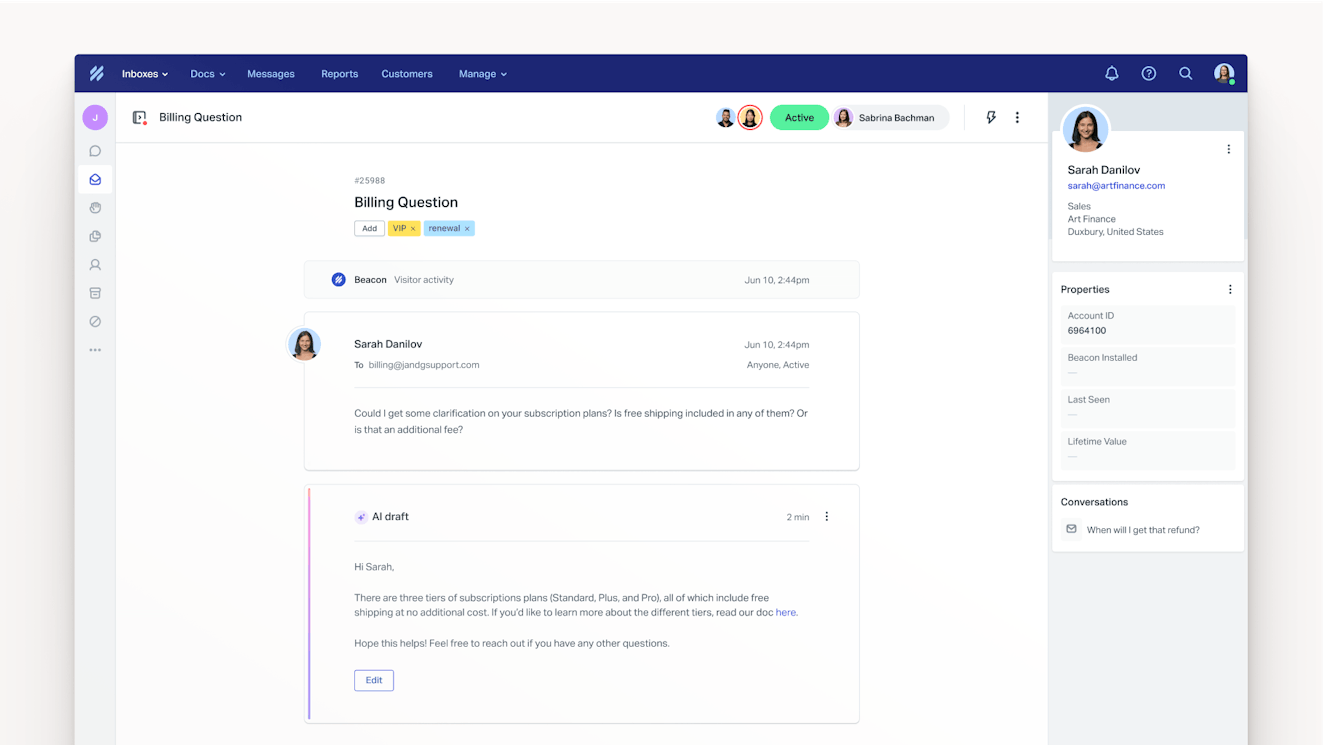
For those looking to add AI to their customer support processes, Help Scout offers four AI features that can help your team do their best work:
AI Summarize: Condense long conversation threads into a few bullet points, helping your team get up to speed quickly.
AI Assist: Lengthen or shorten a response, check grammar, translate text into a different language, or adjust the tone of a message.
AI Drafts: Use AI to draft responses to your incoming conversations. Agents can choose to edit the draft or send it as-is.
AI Answers: Add AI to any Beacon to answer customers' questions instantly.
AI Drafts and Answers are trained on your help center content and your replies to previous conversations to ensure that the drafts and replies it creates are as accurate as possible.
Reporting and analytics
Help Scout's reporting can help you keep track of your efforts. See how individual agents are performing, measure contact volume or response time, see which knowledge base articles are making an impact, and uncover where you have room to improve.
Key features
Manage requests from all channels — email, chat, and social — in every plan.
Use AI to draft email replies, perform translations, summarize conversations, reply to live chat inquiries, and check spelling and grammar.
Add unlimited users at no additional cost; get the whole company involved if you want.
Get requests to the right person/team, and save time with workflows and saved replies.
Stay organized with custom fields, views, message snoozing, tags, and teams.
Track team performance and customer satisfaction with reports and CSAT/NPS surveys.
Deliver personalized support with customer profiles and 100+ integrations.
Limitations
Help Scout integrates with phone support providers like Aircall, Talkdesk, and CloudTalk but does not offer phone support natively. It also does not offer features for building customer portals or creating community forums. If these are features you're using in Freshdesk that you want to make sure to get in an alternative, Help Scout might not be right for you.
Migrating from Freshdesk to Help Scout
Help Scout offers automatic migration from Freshdesk to Help Scout using Import2, and the service is completely free for most customers. Import2 will migrate all of your tickets/emails, tags, and customer profiles from Freshdesk to Help Scout.
Pricing
Free plan and trial available. View Help Scout's current pricing.
Learn more about Help Scout:
2. Keeping – Best Freshdesk alternative for small businesses

Small businesses without a dedicated support team may want to consider Keeping as an alternative to Freshdesk. It's a Gmail add-on that adds a shared inbox to your existing account, allowing your whole team to see and reply to customer inquiries from their Gmail inboxes.
Keeping creates a separate "Keeping" folder in Gmail that houses emails sent to your support@ email address. All team members with access to the folder will see it in their Gmail sidebar. It also adds features that will save you time and keep you organized, like ticket assignments, saved responses, tagging, internal conversations, and basic rule-based support workflows.
If you're looking for a Freshdesk alternative that lets you manage email requests in one unified inbox and doesn't require a lot of training for new users, it's a great, affordable option.
Key features
Assign emails to individuals, set priorities, add tags, and change statuses.
Create a database of saved responses to reply to inquiries quickly.
Integrate with Shopify to see order details alongside customer emails.
Collaborate on emails with teammates privately in a sidebar.
Create simple rule-based workflows to route emails, add tags, and set priorities.
Access reports on number of tickets resolved and average response times.
Limitations
Keeping is a very simple customer service platform designed for email support only, so if you're looking for more advanced features like SLAs, customer portals, and AI — or want to offer chat, social, or self-service support — it's not going to be the best choice for your needs.
Pricing
Free trial available. View Keeping's current pricing.
3. Zoho Desk – Best for access to a large suite of business tools

If you were excited about using Freshworks to consolidate multiple business tools under one brand umbrella but were disappointed to find that they didn't integrate properly, Zoho's products might be perfect for you. In addition to Zoho Desk — its customer service platform — it offers more than 100 different apps for sales, marketing, HR, finance, legal, development, and more.
As far as Zoho Desk goes, you can offer support across all channels — email, chat, phone, self-service, and social. Unlike Freshdesk, you won't have to purchase add-on products, but different channels are parts of different plans. You'll get email and social on the lowest-tier plan, chat and self-service on the second-tier plan, phone on the third, and AI features on the fourth.
Zoho Desk's feature set is very similar to Freshdesk's. You can create community forums and customer portals, set SLAs with automatic escalations, route tickets via round-robin and skillsets, and create rule-based workflows. Its automation tools can reply to emails for you, analyze sentiment, tag tickets, and surface insights for managers.
Key features
Consolidate and integrate all business tools under the Zoho brand umbrella.
Assign agents to specific customers to route inquiries to the right person automatically.
Set up instant messaging with WhatsApp, Messenger, Instagram, Telegram, and more.
Build workflows with a no-code drag-and-drop builder to automate repetitive tasks.
Publish knowledge base articles in more than 40 languages.
Create sub-tickets and connect them to a parent ticket for complex requests.
Limitations
As far as features go, Zoho Desk is very comparable to Freshdesk, so it will likely have all of the features you need. However, customers do report that the mobile app isn't as feature-rich as the desktop app, getting the system set up is complicated, and a lot of the options for customizing the platform require development support.
Pricing
Free plan and trial available. View Zoho Desk's current pricing.
4. Zendesk – Best Freshdesk alternative for enterprise companies

If you've outgrown Freshdesk and are looking for something that's much more customizable, offers more integration capabilities, and has every feature you might ever need, Zendesk's robust customer support software is probably the right choice for you. You'll pay more for Zendesk than you do for Freshdesk, but the higher cost will get you all of the features you had in Freshdesk and more.
Zendesk integrates with nearly 2,000 third-party apps. You can connect it to nearly every CRM, billing platform, ecommerce shop, social media site, and more. It supports all channels natively (though like Zoho Desk, different channels are packaged into different pricing plans), and you can even add light agents to give limited access to the platform to non-support team members.
As far as AI features, Zendesk has AI agents that are similar to Freshdesk's AI copilot. They support your team members by suggesting replies and executing actions for you. You can also use AI to automatically reply to customers over live chat, turn a few bullet points into an entire knowledge base article, and route tickets to the right team or agent.
In terms of customization, you can use Zendesk's Sunshine™ platform to build custom apps that make the platform work exactly like you need it to. Apps can be built by customer support teams using a no-code workflow builder, or you can bring in your development team for more complex builds — Sunshine™ uses open standards and common programming languages.
Key features
Deliver omnichannel support across email, phone, social, self-service, and chat.
Customize the platform as much as desired, either with code or with a no-code builder.
Manage conversations from Facebook, Instagram, X, WhatsApp, Slack, WeChat, LINE, and more.
Receive and reply to text message service requests from your ticketing system.
Build both external and internal knowledge bases.
Give non-support team members limited access at no additional per-user charge.
Limitations
As far as features go, Zendesk will have everything you could possibly need. However, customers report that Zendesk's setup process is complex — you're looking at a minimum of a month of setup time for small teams — your pricing will increase every time you want to access a new feature, and when you need support from their team, you might not get it.
Pricing
Free trial available. View Zendesk's current pricing.
5. Intercom – Best Freshdesk alternative for AI-first support

If you really liked Freshdesk's AI features and want to automate even more of your customer service operations, Intercom is a good customer communication platform to consider. It has everything Freshdesk offers — automatic replies to customer queries via chat and email, copilots to help your agents work faster, AI-powered analysis and insights — and much more.
You can use AI to triage and route tickets and to generate answers for customers. Create detailed workflows using Intercom's no-code builder to dictate exactly what the AI should do for different types of queries. In addition to using data from your site, previous replies, help center, and other sources you feed it, Intercom's AI Agent, Fin, can also be connected to data from third-party systems to personalize its responses to customers.
Beyond using third-party data to personalize responses, Intercom's AI agents can update data in third party systems. Set it up to automatically perform tasks like canceling orders for customers, processing refunds, changing reservations, and updating billing information.
As far as insights and analysis, Intercom's AI can interpret conversations to populate customer satisfaction scores even when customers don't rate support interactions themselves, identify and point you to low-quality customer interactions so you know where more training is needed, and show you where your help center articles are failing your customers when they're looking for answers on their own.
Key features
Deliver omnichannel support across email, chat, social, self-service, and phone.
Use AI to resolve customer inquiries automatically over chat, social, and email.
Set up tasks to have AI agents route and triage tickets or handle basic requests.
Add collaborator seats to give limited platform access to non-support team members.
Use AI to automatically identify unhelpful support replies and knowledge base articles.
Create and send bulk email, SMS, WhatsApp, and phone campaigns.
Limitations
If you were using Freshcaller to answer customer questions over the phone with AI, you won't find that feature in Intercom. Its AI features are limited to text-based support channels.
Additionally, while Intercom has a basic plan that's comparable in price to Freshdesk, its more robust plans have a starting price that's more expensive than Freshdesk's priciest plan, so it's not a good option if you're looking to reduce your costs.
Pricing
Free trial available. View Intercom's current pricing.
6. HubSpot Service Hub – Best Freshdesk alternative for startups
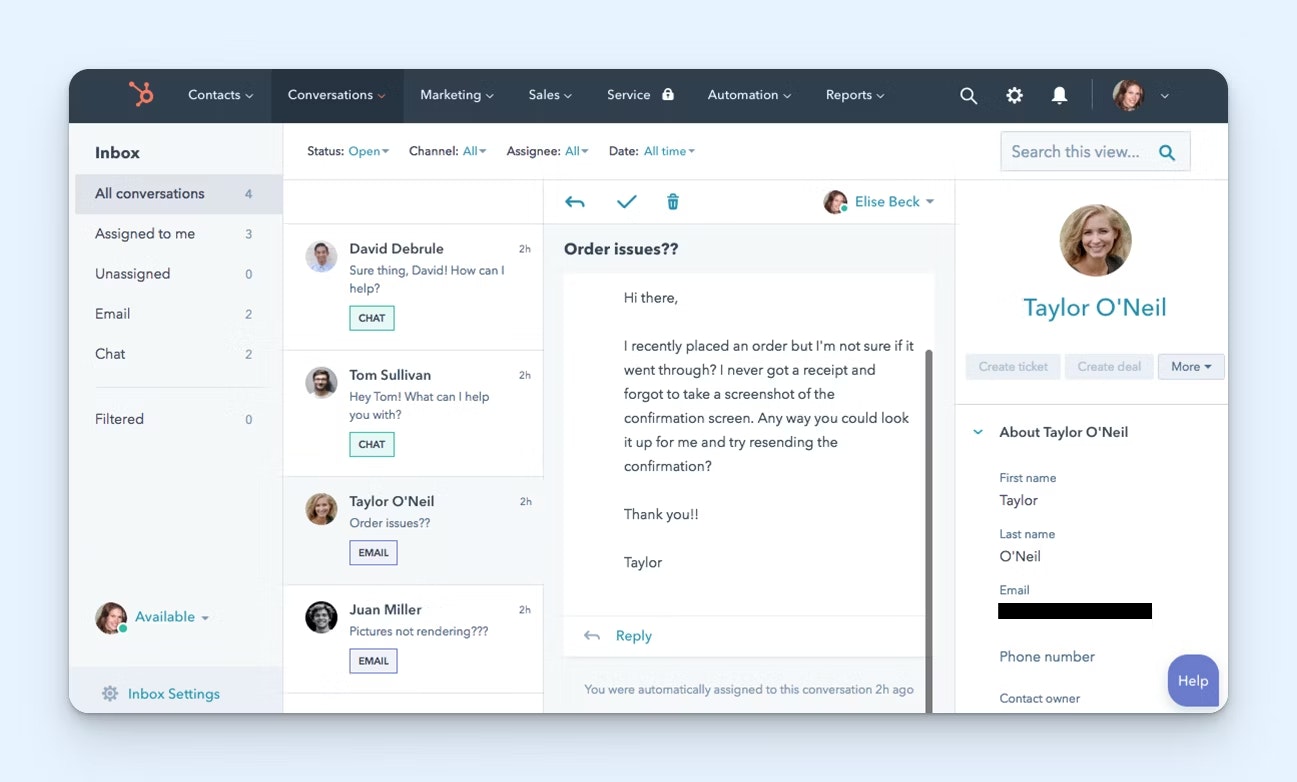
HubSpot Service Hub is a good alternative to Freshdesk for startups that need robust systems for support, sales, and marketing. Its startup plan can reduce the cost of its software by as much as 75% for your first year, 50% for your second, and 25% for your third, and it includes full access to the brand's Service Hub, CRM, and Marketing Hub products.
Service Hub has a lot of the features you're used to from Freshdesk. You can create customer portals, set SLAs, launch a chatbot to answer questions automatically, and route tickets to the right teams. Because your CRM, marketing tools, and help desk are all managed by the same brand, all of the data from each system passes to the others instantly and seamlessly.
HubSpot's connection between the systems makes it particularly useful for sales-led startups without a dedicated support team — or with sales/customer success team members providing support. Because your help desk is in the same system they use as a CRM day to day, they'll be familiar with the interface and won't have to struggle to learn a new tool.
Key features
See all data from CRM, Marketing Hub, and Service Hub in the same platform.
Get a significant discount on multiple business tools if you meet specific criteria.
Build secure portals for specific customers.
View a customer success dashboard with health scores and insights to reduce churn.
Answer customer questions instantly with AI that's trained on your help center content.
Send NPS, customer satisfaction, and CES surveys to customers.
Limitations
HubSpot is missing some features you might have been using in Freshdesk. You can't use it to create community forums, and its skill-based routing rules are only available on its Enterprise plan. And while you can accept inbound phone support calls using HubSpot, you won't get any of the call center features of Freshcaller like IVR, voice bots, or converting calls into tickets.
Pricing
Free plan and trial available. View HubSpot's current pricing.
7. Front – Best Freshdesk alternative for agencies
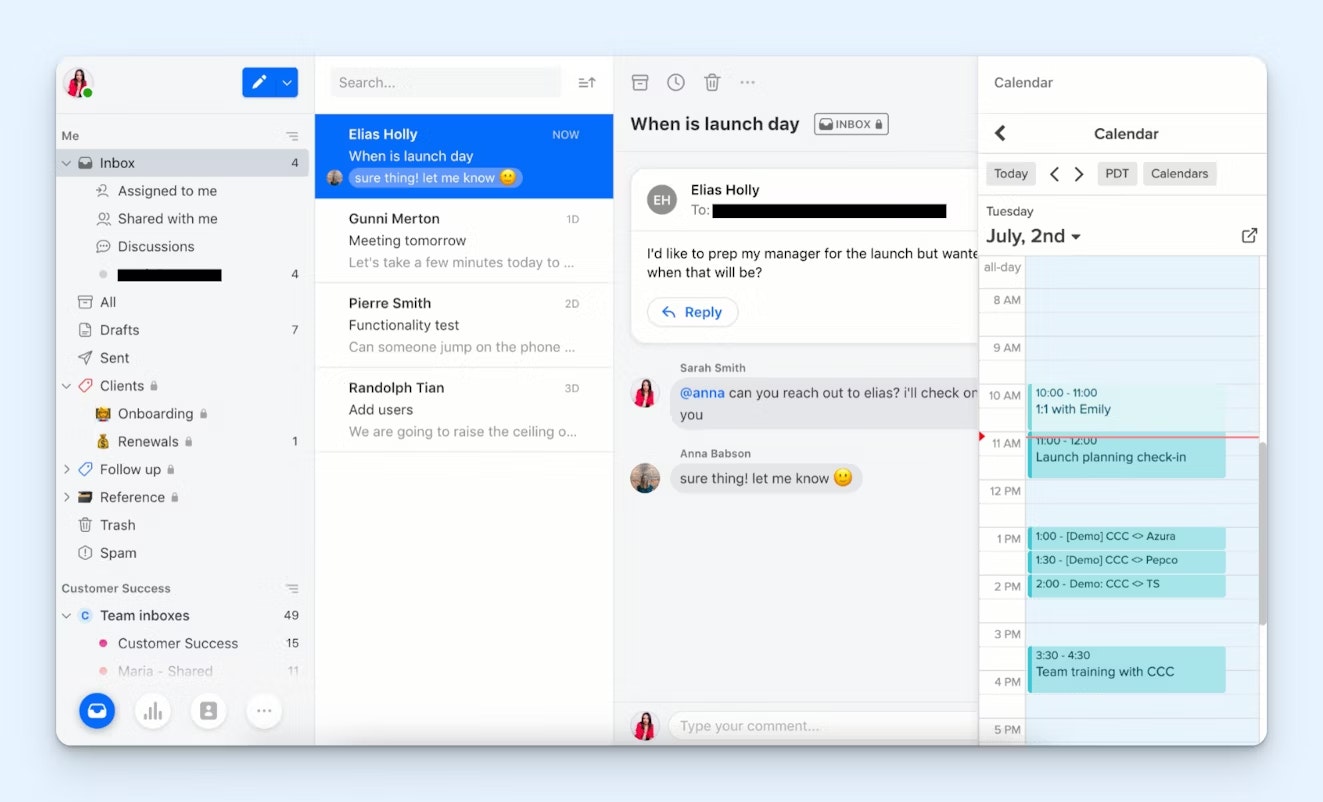
Front's help desk software is unique in that it lets you manage and share email across both your shared and personal email accounts. Companies can add all of their email addresses to the system — both jessica@ and support@ — to manage all of their email inboxes in a single platform.
By default, personal email inboxes aren't accessible by other members of the team, but you can give either temporary or permanent access to a personal inbox to others when needed. This is helpful if someone's going to be out of the office, as well as if you have a single point of contact — such as an account manager — that multiple clients email. You can triage and reply to emails sent to that individual as a team.
Beyond email management, you can also use the platform to deliver live chat support and create a knowledge base. AI will automatically answer simple live chat questions for you using knowledge from your help center, and features like collision detection, internal discussions, and guest access will help your team collaborate on incoming requests more easily.
Key features
Create inboxes for both shared and personal email addresses.
Share access to personal email inboxes temporarily or permanently.
Create private customer portals and set SLAs for reply and resolution times.
Build both internal knowledge bases and external help centers.
Sync customer data from Salesforce, HubSpot, and Microsoft Dynamics 365.
Use AI to create drafts of help center articles and translate articles into other languages.
Limitations
Front integrates with Aircall and Dialpad but does not offer phone support natively. It also does not have a community forums feature. If these are features you're using in Freshdesk that you want to make sure to get in an alternative, Front might not be right for you.
Pricing
Free trial available. View Front's current pricing.
8. Text – Best Freshdesk alternative for à la carte pricing
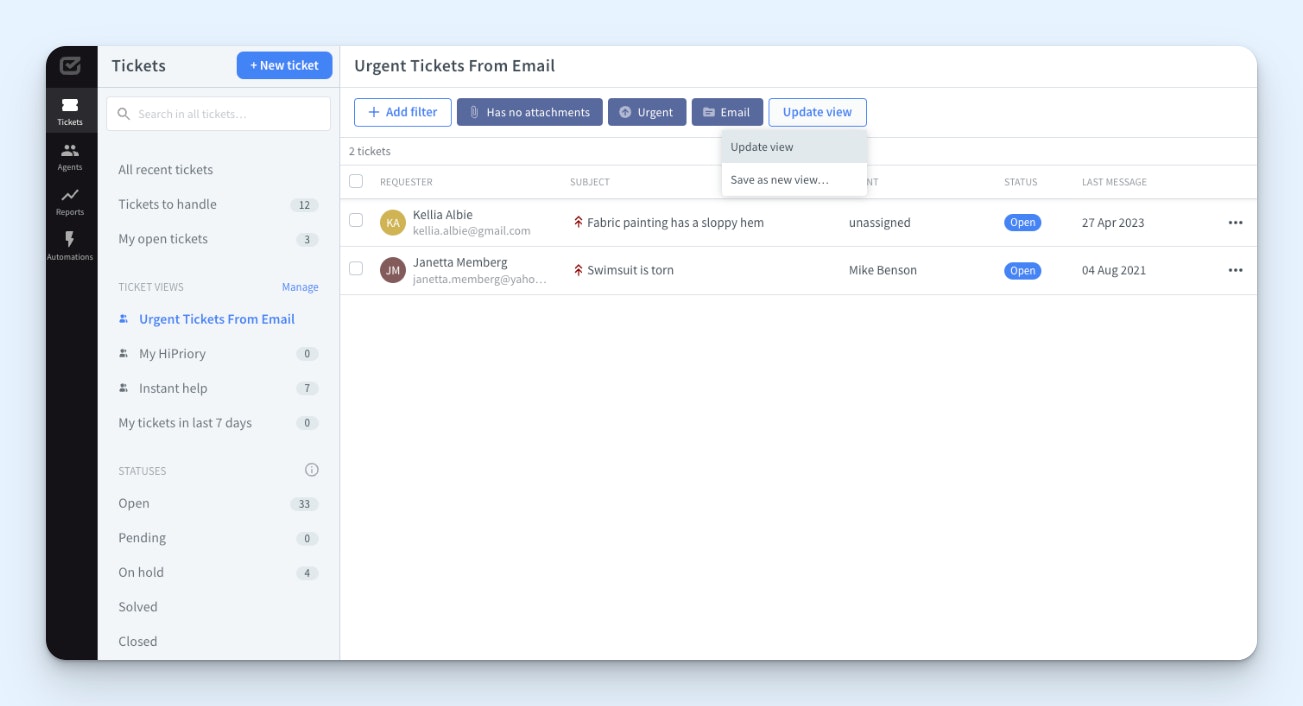
For customers who want to deliver multi-channel support, having to subscribe to multiple Freshworks products to do so can be frustrating. However, it can also be an approach to saving costs if you don't need to deliver support across every single channel. If you want to minimize costs by buying products for only the channels you plan to use, Text is worth considering.
Text offers multiple support products that are entirely focused on individual channels. HelpDesk comes with all of the features you'll need for email support, LiveChat has all of the features you need for real-time chat support, KnowledgeBase lets you create internal and external help centers, and ChatBot lets you answer customers' questions with AI.
Key features
Pay only for the specific support channels your team plans to use.
White label any of the products to customize them with your own branding.
Pay a flat fee for a set number of AI resolutions instead of paying for each individually.
Create different email templates for different teams to use in HelpDesk.
Track visitor journeys with LiveChat to see all pages they viewed.
Route live chat conversations to the right agent automatically in LiveChat.
Limitations
While Text's products can be a low-cost option if you only need to deliver support on a single channel, the cost will get much higher if you want to scale to other channels in the future. There are also some features you might have used in Freshdesk that you won't find in the Text suite, such as phone support, customer portals, SLAs, and community forums.
Pricing
Free trial available for all products. View current pricing for HelpDesk, LiveChat, KnowledgeBase, and ChatBot.
9. Gladly – Best Freshdesk alternative for phone support

Gladly is a great help desk solution for retail and ecommerce companies that deliver support primarily via phone. While it doesn't have AI-powered voice answers like Freshcaller, it does offer a lot of features that save your agents time and let customers self-serve their own support requests.
Gladly's IVR system can be used to not only route customers to the right agent but also to automatically provide them with information like order status updates and loyalty points balances. You can build an IVR tree that's as simple or as complex as you need it to be with a visual builder that lets you control every aspect of the automated phone support experience.
Customers can also opt into turning their phone call into an SMS chat if they don't want to have to wait on hold for an agent to help them. Instead, they can just wait to receive a text message that answers their question. On the back end, agents can listen to what the customer said before the transition and also see an AI-provided summary of it, then they can type a reply just like they would for a live chat request.
Gladly also supports callback requests for customers who don't want to wait on hold, automatically routes customers with specific attributes to the right agent via workflows, and allows customers to leave voicemail messages.
Key features
Set up and manage support across multiple communication channels.
Provide customers with simple updates automatically through an IVR system.
Give customers the option to transition phone support requests to email or SMS.
Accept payments from customers through messaging channels.
Route customers to the right agent based on status, sentiment, language, and more.
Merge duplicate requests/replies from multiple channels into a single ticket.
Limitations
Gladly's pricing is not publicly available, which generally means its pricing is high. It's almost certain to be more expensive than Freshdesk, which is priced for smaller teams. There are also some features in Freshdesk that you won't find in Gladly, such as community forums and customer portals.
Pricing
No free trial offered. Contact Gladly for pricing.
Choosing the right Freshdesk alternative for your team
Hopefully the details above helped you create a shortlist of Freshdesk alternatives to consider, but we recommend doing a few more things that will help ensure you're making the right choice.
First, get demos or start free trials of the customer support tools you're considering (or do both). Demos are great for getting answers to questions you weren't able to find the answers to on your own, and free trials let you use the tools as you would in your day-to-day work. There's no better way to decide if a platform is right for you than to actually use it.
Second, read through online reviews to see what other customers think about the tool. Want to avoid the clearly incentivized five-star reviews from happy customers and the overly dramatic one-star ones? We recommend checking out the three-star reviews to get a more balanced perspective.
Finally, reach out to the support team to see how quickly you get a response and how helpful that response is. No matter how easy a platform is to use, you'll inevitably need help at some point, so it's important to make sure that the software you choose offers the same level of exceptional support that you strive to deliver to your own customers.
Follow these steps to have more confidence that the Freshdesk alternative you choose is going to be the best possible option for your team.












